|
|
|
Sort Order |
|
|
|
Items / Page
|
|
|
|
|
|
|
| Srl | Item |
| 1 |
ID:
188903


|
|
|
|
|
| Summary/Abstract |
Track Two Diplomacy, a form of facilitated informal and unofficial dialogues between conflicting parties, has become a well-established form of international conflict resolution. This paper seeks to explore whether the techniques and practices of Track Two could be applied in a new setting beyond international armed conflicts: public health. Global society continues to grapple with the devastating effects of the COVID-19 pandemic, systemic racism, and climate change, among other pressing public health issues that can not only exacerbate but also create new conflicts that negatively affect communities. Innovative and interdisciplinary approaches are needed more than ever. We synthesize literature from both Track Two and public health fields to present a conceptual framework that posits whether and how such concepts as the “problem-solving workshop,” “transfer,” “reflective practice” and others might support parties involved in divisive, intractable, visible, and invisible conflicts which currently mark the public health space.
|
|
|
|
|
|
|
|
|
|
|
|
|
|
|
|
| 2 |
ID:
188913


|
|
|
|
|
| Summary/Abstract |
Track Two Diplomacy, a form of facilitated informal and unofficial dialogues between conflicting parties, has become a well-established form of international conflict resolution. This paper seeks to explore whether the techniques and practices of Track Two could be applied in a new setting beyond international armed conflicts: public health. Global society continues to grapple with the devastating effects of the COVID-19 pandemic, systemic racism, and climate change, among other pressing public health issues that can not only exacerbate but also create new conflicts that negatively affect communities. Innovative and interdisciplinary approaches are needed more than ever. We synthesize literature from both Track Two and public health fields to present a conceptual framework that posits whether and how such concepts as the “problem-solving workshop,” “transfer,” “reflective practice” and others might support parties involved in divisive, intractable, visible, and invisible conflicts which currently mark the public health space.
|
|
|
|
|
|
|
|
|
|
|
|
|
|
|
|
| 3 |
ID:
133581


|
|
|
|
|
| Publication |
2014.
|
| Summary/Abstract |
This article examines the escalation of protest mobilization into armed conflict in the Republic of Macedonia (2001). The analysis argues that violence occurred because of a timely collusion between proximate causes and permissive conditions (causes). The state's inherent fragility and the perpetuation of unresolved grievances provided ground for the utilization of opportunity structures by dissident contestants. The study looks into the influence of spillover effects through the lens of contagion and diffusion effects including political radicalization, disputed borderlands refugee flows, and rebel capacity, and provides an assessment of the conditions shaping the decision of the Albanian rebels to use violence. Drawing from a series of elite interviews and documents, the article offers a critical insight into how ethno-regional interdependencies render a largely non-violent conflict susceptible to escalation. The study finds that contagion, disputed borderlands, and the availability of existing operational networks have played a crucial, if not decisive, role in the decision of politically active Albanians in the Republic of Macedonia to use violence.
|
|
|
|
|
|
|
|
|
|
|
|
|
|
|
|
|
|
|
|
|